Each year the UK Foreign and Commonwealth Office offers the prestigious Chevening Scholarship to promising students chosen for their leadership potential and academic promise. For academic year 2023/24 Birkbeck welcomes 21 Chevening scholars hailing from all corners of the world. Here, we get to know some of them a little better.
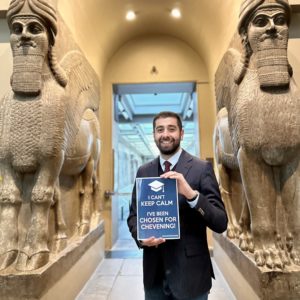 Ahmed Maki from Iraq, studying MSC Entrepreneurship
Ahmed Maki from Iraq, studying MSC Entrepreneurship
Ahmed has dedicated himself to the fields of business development and entrepreneurship. His professional journey has been impactful, involving collaborations with international NGOs and private sector companies to nurture the growth of SMEs and start-ups in Iraq. His dedication to advancing the private sector in his home country reflects a profound commitment to economic development and entrepreneurship.
“I applied for a Chevening scholarship for the 2023-2024 cohort with a dual purpose. Firstly, I aspire to join the ranks of international leaders who serve as ambassadors for their respective countries. Being a Chevening scholar would enable me to represent Iraq globally, contributing to the international assembly of leaders. Secondly, Chevening is not merely an academic scholarship but a transformative, lifelong experience. I anticipate gaining valuable lessons throughout my Chevening journey, building a global network, and utilizing global expertise and progress in entrepreneurship to bolster the entrepreneurial sector in my home country, Iraq, and elevate it to the status of a developed nation in this domain.”
 Leena Shibeika Izzledin Mekki from Sudan, studying MSc Geography
Leena Shibeika Izzledin Mekki from Sudan, studying MSc Geography
An architecture graduate from the University of Khartoum Leena turned into an urbanist and is currently pursuing MSc Geography at Birkbeck.
“I consider myself a social activist and leader who’s driven by an endeavour to challenge the status quo, and I’m passionate about advocating for Urban-Social Justice in cities.
I applied to Chevening because my aim is to facilitate my role as an urban researcher and geographer to reach out to and work for and with vulnerable communities, specifically women; internally-displaced-persons; and citizens who exist within informal habitats and work settings in Khartoum. I acknowledge their struggle as a compass for my work. I aspire to contribute to Sustainable Development Goal 11; Sustainable Cities and Communities and work specifically in ensuring access for all to housing and basic services and enhancing sustainable urbanisation and participatory planning in Sudan.”
 Sidhant Bali Maharaj from Fiji, studying MA Gender and Sexuality Studies
Sidhant Bali Maharaj from Fiji, studying MA Gender and Sexuality Studies
Selected as a UN Women 30 for 2030 youth leader in Southeast Asia and the Pacific, Sidhant is an Intersectional Queer Feminist Activist from Fiji with over 8 years’ experience working in the areas of Women, Girls, LGBTQI+ rights, and Youth Empowerment.
“After the completion of my MA in Gender and Sexuality Studies, I plan to further my research in Fiji and the Pacific and work more closely with the public and private sector in developing/updating more inclusive and diverse policies that has women and LGBTIQ+ community as safe guarded categories shifting from the gender as binary narrative.”
 Elena Nechaeva from Kyrgyzstan, studying MA Digital Media Management
Elena Nechaeva from Kyrgyzstan, studying MA Digital Media Management
A journalist, producer, documentalist, presenter, video blogger, co-founder of the public fund Media Space, and media trainer from Kyrgyzstan, Elena started her career on television in 2011 covering breaking news and making feature stories.
“My long-term goal is to launch a large-scale project in the media sector of Kyrgyzstan and make it sustainable. It will embrace the creation, development, and promotion of new media on different platforms and support and training for beginner bloggers who create helpful and socially significant content.”
 Iddi Yassin from Tanzania, studying MSc Sport Management
Iddi Yassin from Tanzania, studying MSc Sport Management
Admitted to the Tanzania Mainland Bar Association in 2016, Iddi practiced law as an Advocate of the High Court of Tanzania.
“I applied for Chevening in 2023 because it is arguably the most prestigious scholarship programme with remarkable scholars and alumni networks from different social, economic, and political backgrounds. My long-term plan is to become a football agent and managing young athletes in Tanzania to fulfil their career ambitions in global stages, hence with the extensive skills acquired from my postgraduate studies this will be achieved through a rich network to support my vision and career plan.”
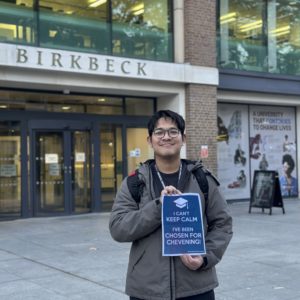 Aslan Saputra from Indonesia, studying MSc Business Innovation
Aslan Saputra from Indonesia, studying MSc Business Innovation
CEO and Founder of Gumugu, an IT company that provides paperless services and digital education systems that have been used in several cities throughout Indonesia and Malaysia, Aslan also founded a coworking space in his hometown of Aceh in Indonesia.
“My long-term plan for the future is that I want to expand my business outside of Indonesia, especially in Southeast Asia and several European countries, and with the Birkbeck and Chevening alumni network, I hope that my plan will come true.”
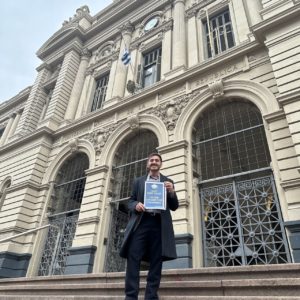 Iván Luzardo Ruiz from Uruguay, studying LLM Law General
Iván Luzardo Ruiz from Uruguay, studying LLM Law General
A Human Rights lawyer, Iván has worked for the Human Rights Unit of the Presidency of the Republic of Uruguay, responsible for investigating Crimes Against Humanity during the last dictatorship in Uruguay. He has also been involved with the nationwide volunteering programme called Free Legal Clinics which provides free legal advice and representation in court to more than12,000 people per year.
“I was highly honoured by being awarded the Chevening Scholarship 2023-2024, as this is one of the most prestigious and high-level networks around the globe. Being a Chevening Scholar means taking part in a broad group of like-minded future leaders who aim to develop and build impactful and meaningful changes while studying in a spectacular and inspiring academic environment. This allows us to strengthen our relations with others, improve the projects we want to develop, and expand its beneficial impacts.”
 Rama N’Diaye from Mali, studying MSc Entrepreneurship
Rama N’Diaye from Mali, studying MSc Entrepreneurship
Passionate about entrepreneurship, Rama is the Associate Director of Programmes and Partnerships at Impact Hub Bamako in Mali, where she supports young people with their entrepreneurial dreams. In her role as Communication Coordinator of the National Council of Business Incubators and Innovation Centres of Mali, she played a pivotal role in fostering a vibrant entrepreneurial ecosystem, leading her to be a key speaker at the World Bank Group Regional Youth Summit in May 2023.
“Gaining education in Business development and Innovation strategy combined with my experience, will help me acquire the capability to work in an extensive range of senior functional and general management positions across a wide spectrum of business sectors in Mali and the whole region.
By sharing knowledge through education and networks with Malian entrepreneurs, I can play a key role in helping young entrepreneurs. With my international Chevening network and knowledge I want to create more opportunities for entrepreneurship advancement in Mali. Overall, I intend to put the new skills and knowledge I will have acquired from my education in the UK into good use in Mali like I have done so in the past.”
 Nodar Rukhadze from Georgia, studying MSc Government, Policy and Politics
Nodar Rukhadze from Georgia, studying MSc Government, Policy and Politics
A journalist with a background in human rights activism, Nodar graduated from the Georgian Institute of Public Affairs (GIPA) with a Social Science degree. In 2019, he co-founded the Shame Movement, which rapidly evolved into Georgia’s leading civil platform. Nodar has orchestrated over a hundred demonstrations and ten informative campaigns, significantly influencing government policies. A highlight of his activism was the historic demonstration on June 20, 2022, advocating for Georgia’s European integration.
Understanding the crucial role of young, educated leaders in mitigating Georgia’s political challenges, Nodar is currently focused on activism and campaigning, with ambitions to enter politics. Nodar’s vision encompasses expanding civil organizations’ influence and building consensus among diverse policy stakeholders. He aspires to see Georgia join the European Union and NATO, believing in the power of young Georgian leaders to realize this goal.
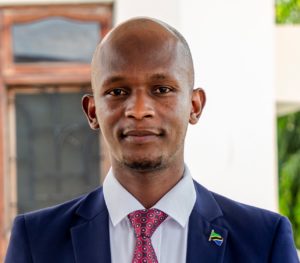 Ian Tarimo from Tanzania, studying MSc Business Innovation
Ian Tarimo from Tanzania, studying MSc Business Innovation
A dynamic social entrepreneur from Tanzania, Ian is the recipient of the prestigious Leadership Impact Award from the US State Department’s Young African Leadership Initiative. He has also been recipient of the Builders Africa Future Award by the African Diaspora Network.
He is also the Founding Executive Director of Tai, a social enterprise utilizing data, storytelling, and technology to create educational and entertaining content, including 3D animations, radio drama, music, and comics.
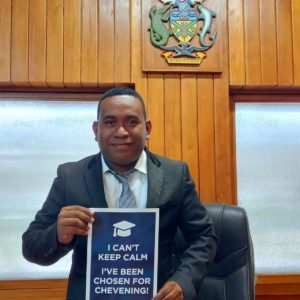 Felix Hollison from the Solomon Islands studying LLM Law with Pathways – Law and New Technologies
Felix Hollison from the Solomon Islands studying LLM Law with Pathways – Law and New Technologies
A Lawyer by profession Felix has worked as a Senior Crown Counsel in the Attorney-General’s Chambers in Solomon Islands from 2015 to June 2019 before joining the Central Magistrates Court of Solomon Islands in June 2019 as a Principal Magistrate.
“The phenomenal changes in technology transform the way society operates in ways that have consequential effects on the law around the globe. My country is susceptible to the adverse effects of technological changes such as the erosion of democracy, climate change, cybercrime, biotechnology, political radicalisation and automation to name some.
I wish to gain the necessary academic and professional knowledge to assist my country navigate through these uncertain times. Modernising my country’s laws to keep abreast with the technological and normative changes is a must and I wish to be an agent of change in my country.”
Find out more about: